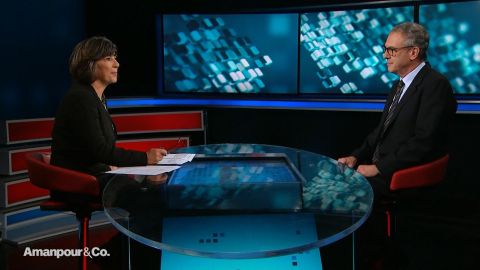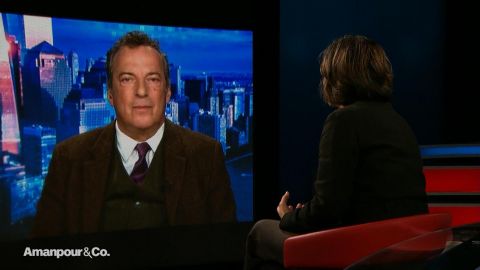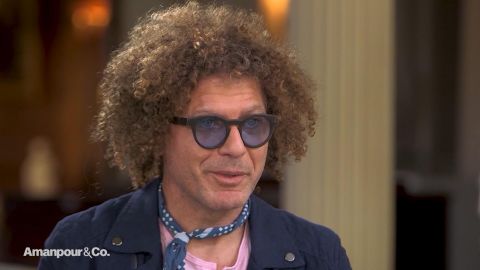Read Transcript EXPAND
Please welcome to the stage the Jaffe family, saviors of New Orleans jazz.
In the early 60s, Alan and Sandra Jaffe created a refuge for musicians and so the Preservation Hall Jazz Band was born, a cultural treasure that left discrimination at the door.
Now, their son Ben Jaffe helms this ship and a new documentary, 'A Tuba to Cuba' exploring the legacy of this family and their band.
He told our Walter Isaacson why he believes diversity is at the core of jazz.
Ben Jaffe, welcome to the show.
Your father comes from Philadelphia with your mother, Al and Sandy Jaffe and they're at the Hall in 1961, it's really an art gallery but they have a few musicians play now and then and they decide that they have to help resurrect traditional jazz.
Why was that? Had it fallen out of favor?
New Orleans jazz, by the time my parents had arrived here, was had almost disappeared from from the, you know, from the landscape, from the musical landscape and my parents discovered this gallery and this group of artists and you know sort of preservationists, I guess, musical preservation is that we're having these very small jam sessions, really just for themselves, in this gallery that was had become an artist collective and that was the idea for Preservation Hall was to continue to bring out of retirement or to help organize this community of African-American jazz pioneers, these musicians that had been there at the birth of jazz and provide a an environment, a stage for them to perform and that's what Preservation Hall became.
[Television Ad] 'New Orleans people of course are aware their jazz heritage is disappearing and some are trying somehow to save the only art form that is strictly, entirely American.
One effort to save it is here at Preservation Hall and a young couple named Alan and Sandra Jaffe started this.
What we're trying to do here is just present the music.
The people are sitting on wooden benches, sitting on the floor.
There's no drinks. Pretty hot in there too in the summer. People come just to hear the music and I think the men realize this. The men play it the way they want to play it. The people hear it.'
When I was growing up here in New Orleans, used to to the hall all the time, I began to realize it wasn't just about the music, it was about the musicians, that in some ways they had been resurrected and saved by this hall.
It was always about the musicians.
It still is.
On this thing that my parents became a part of, the thing that was most meaningful to them was becoming a part of these musicians lives that had given so much of themselves.
Who did they discover, I mean rediscover.
I mean they they brought back to life Punch Miller, an incredible trumpet player.
I mean Louis Armstrong talks about Punch Miller as being his his his rival coming up. You know George Lewis who was regarded as really a king of jazz outside of New Orleans, in Europe and in Japan, but in New Orleans really didn't have an outlet for his music.
William Percy Humphrey, Sweet Emma Barrett.
And these people were marginally employed or unemployed before the hall bring them in?
There were very few opportunities for them to perform in New Orleans.
There would be maybe social dances actually right along here maybe on St.
Charles or up here at Tulane for prom dances.
At carnival time, at Mardi Gras they would have parades.
Mostly it was for themselves at times of mourning, when a member of the community would pass away and musicians would come together to celebrate and honor that person's life with a jazz procession at their at their funeral but besides that, you know jazz in the 1950s wasn't something that that was being celebrated on a concert stage.
It was, if you were able to find jazz musicians, it was in a barroom setting.
You know occasionally there would say there would be a band on Bourbon Street with dancers and you know you'd be hustled for drinks. You know the two drink minimum and you know tips and whatever and there might be a comedian and a tap dancer and you know that kind of thing. But there was never a place that presented music the way that Preservation Hall did.
But something about those places you talked about then, they were all segregated.
Yes.
And one of the things that Preservation Hall does is not only does it revive the jazz it is actually very strongly in the forefront of the integration of New Orleans.
It was, yes it was very much from on the vanguard of that movement.
Your parents were doing that consciously?
It wasn't something that my parents had intended to do, but it was a product of what they were creating.
After talking to my mom for you know for so many years and knowing my father, it was part of their innocence, they couldn't really imagine life any other way, you know, and being outsiders coming from Philadelphia, this was a foreign idea to them, you know, segregation.
Also my dad wanted to play with these musicians, these these idols of his, these musicians that, you know, he had listened to for so many years on albums and now was getting to not only meet for the first time but also able to employ and provide a sanctuary, you know, of sorts for them.
You know when Jelly Roll Morton is playing Storyville in the late 1890s he I think he does a song Basin Street Blues and it talked about where the black folk and white folk meet and that was sort of common and then we lost that in the 40s and 50s.
There was a resegregation.
Did your parents get pushback for creating an integrated entertainment venue?
They occasionally would get shut down.
The hall would be shut down and people would be dragged off to night court.
Your mother must not have been good at night court.
She she's not one to be very conservative with her words sometimes and her feelings.
But she she you know it was never anything lasting.
I mean New Orleans obviously has a very different relationship with race than most cities.
And what do you mean by that, better or worse or more complex?
More complex but definitely better than anywhere else in America.
We were very far ahead of everybody else.
We still have a long way to go, it's never, that that battle's never never won.
I believe it's something that it's ongoing every generation has to come to peace, you know some peace with its relationship with race, but at that time it was you know, you know just being able to have white and black musicians performing together was unheard of.
Some people question when people say diversity is part of our strength, part of our creativity, they say why.
Why is diversity good?
I've never really thought about it because diversity is, we've always celebrated diversity. I mean New Orleans is a celebration.
Tell me about through the music.
What's strands, you have Haiti, you have Cuba.
Yeah.
Marching bands, Spanish American War, Creole.
Yes. I mean we have I mean African I mean our music is African. It's also it's also western.
I mean the instrumentation of our bands, I mean these you know trumpets and clarinets and trombones and pianos, these are Western instruments that you know have mixed with this the the rhythms and melodies and you know traditions, spiritual traditions of of you know of so many different cultures.
Diversity is at the core of jazz.
It's, I don't even think we even talk about it because it's just accepted as is a key ingredient.
You just did an amazing documentary on the band, The Preservation Hall Jazz Band's trip to Cuba.
Why did you do that?
We as a band had always wanted to visit Cuba and the doors had been closed to us and we had been looking for a way to get there and then the embargo was lifted and we raised the funds to get the band down.
For us, it was important to visit a place that is so connected to New Orleans historically.
Is it connected to the music?
Oh definitely, yeah definitely. You you can almost see the physical connection in the music, the African rhythms, the melodic continuity that exists. I mean you can hear it in New Orleans music, the Spanish influence.
You can definitely feel the African pulse in our music and when you're in Cuba, you know, it's it's it's visual.
You can actually see it.
And did the people in Cuba seem to feel the connection to New Orleans jazz?
They understand the connection better than we do.
Yeah we learned almost more about our history from from them.
One of the scenes has the lady showing you the picture of Harold Dejan and the Olympia Brass Band on the wall of the house, was it in Santiago?
It was actually outside it just outside of Havana.
And that was your godfather.
Yeah my paarrain you know Harold Dejan led the Olympia Brass Band and that's who my father played, with the Olympia Brass Band for many decades.
He was you know probably almost single handedly the reason that I'm a musician today is because of Harold Dejan.
Where were you when Katrina hit?
I was here in New Orleans.
I was at my house.
I was helping musicians get out of town.
I was helping Narvin Kimball, who was bedridden at that time and his wife who was blind, get a ride to Baton Rouge.
I was helping to close up Preservation Hall.
I was helping other musicians get ready for the storm.
I had an open door for people at my house.
I lived in what they consider a high area in one of the older sections of New Orleans and we stayed and felt that we could contribute something.
After you helped get people out, how do you get people back?
I started the New Orleans Musicians Hurricane Relief Fund and what I knew was we, musicians needed, we all needed immediate financial help just to stay alive, just to just to get through life because New Orleans is that rare place that actually musicians can actually have a career right here in the city.
You can you can work and go out and play five, six nights a week, you can actually, if you're a tuba player, you can you can work as much as you want in New Orleans.
Four bands, four marches a night.
Yeah yeah exactly.
You know, Walker Percy once said that hurricanes allow us to focus and figure out what we're supposed to be doing and to what extent do you think Katrina allowed you to focus and figure out what you should be doing next?
Oh it Katrina put everything into focus for me and my whole life became crystal clear.
Those those first two years after Katrina 2005, 2006 my entire life came into focus, sbsolutely.
I had purpose.
My purpose was to ensure, you know, my community was safe and that my community had a future, that their families were taken care of. We were all impacted differently.
Some musicians in my band lost everything, they lost their houses, they lost their instruments. You know when I when when I finally reconnected with my band, my trumpet player arrived in the clothes that he was given at a Red Cross you know in Little Rock Arkansas and someone had given him a student trumpet to play.
So it was rebuilding lives brick by brick and we all suffered differently, whether it was personal loss or the loss of a family member, or just the pain of not being able to return to the city that that is your home.
You never come to peace with that.
Ben, this was really great, but there's one thing I learned from your father, which is that if something is really great, it's even greater with a tuba. Do you want to grab your tuba and show us something?
Absolutely.
Thank you, Ben.
About This Episode EXPAND
Christiane Amanpour speaks with former head of UK Foreign Office Simon Fraser about Brexit, Sen. Kirsten Gillibrand about the future of the Democratic Party and author Tim Weiner about the Mueller investigation. Walter Isaacson speaks with musician Ben Jaffe, Creative Director of Preservation Hall.
LEARN MORE



